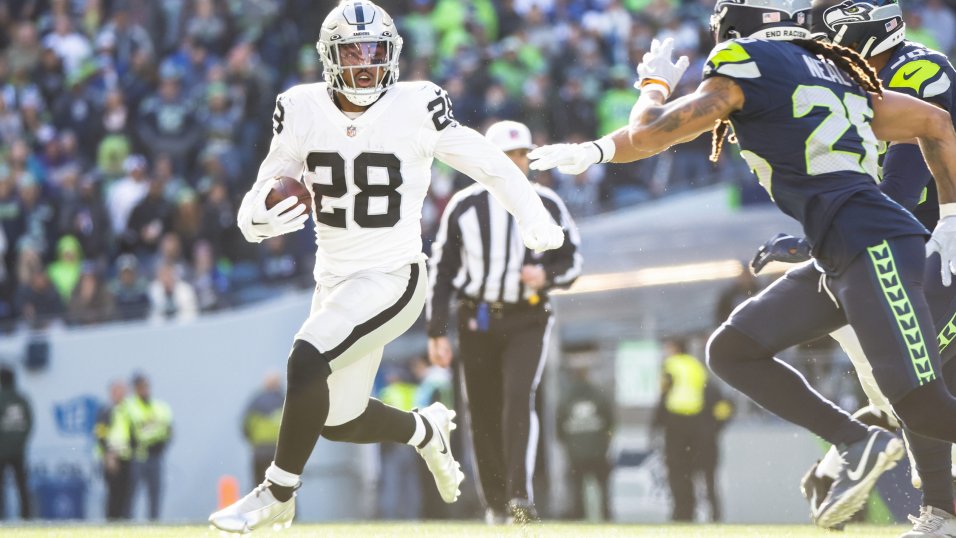The Las Vegas Raiders made the surprising — but also somewhat expected — decision to decline running back Josh Jacobs‘ fifth-year option this offseason. The Raiders' new regime, spearheaded by general manager Dave Ziegler and head coach Josh McDaniels, wasn't willing to commit to him for an $8.034 million option price tag in 2023.
And despite objectively solid production from Jacobs in the first three seasons of his NFL career, it’s not hard to blame them.
Over the past few seasons, NFL teams have often avoided paying big money to running backs on their second contract. In Jacobs' case, for someone who was only a borderline Pro Bowler prior to 2022, it was tough to guarantee him much money for his age-25 season.
The problem for the Raiders now is that Jacobs has taken his game to another level in 2022. He’s a perfect fit in McDaniels’ offense. Jacobs is currently the highest-graded running back in the NFL (93.1) and has been pulling away from his peers over the past few weeks.
Not only does he lead the NFL in rushing yards, but he is also No. 1 in missed tackles forced (64) and is second in yards after contact (827). This isn’t exactly new for Jacobs, either, as he leads the NFL in forced missed tackles (130) since the start of the 2021 season. He’s been one of the league’s most elusive backs since being drafted in 2019.
What’s helped Jacobs really break out this season is his improvement in the passing game. He sits as the sixth-highest-graded receiving running back on the season (72.2). That puts him ahead of players such as Alvin Kamara, Aaron Jones and Dalvin Cook, who are known for their receiving ability. He has caught over 83% of his targets and is averaging an absurd 8.1 yards per reception. Needless to say, this is the best he’s played at any point in his career. He is the total package at the running back position.
So, what should the Raiders do with Jacobs? He’s playing at an All-Pro level and has totaled at least 1,200 yards and seven touchdowns in every season. Through 11 games, he's already surpassed a career high in rushing yards (1,159) and total yards (1,484).
| Josh Jacobs to have most regular-season rushing TDs | +750 |
| $10 returns $85.00 | |
Still, Las Vegas needs to stick to its guns: Err on the side of caution regarding a long-term contract with the former first-rounder. The Raiders declined his fifth-year option in the first place due to the volatility of the running back position and the replacements that can be found in the middle rounds of the draft.
Dave Ziegler and Josh McDaniels never had an issue replacing running backs while with the New England Patriots, as they consistently found productive players at the position on Day 2 and Day 3 of the NFL draft. In their last draft together in New England, they selected Rhamondre Stevenson in Round 4, who just so happens to be a top-10 running back this season by PFF grade.
There is also a concern about the workload Jacobs is on pace for this season. Through 11 games, he’s already totaled 256 touches. To put that in perspective, that is just 15 touches fewer than he had all of last season. He is on track for nearly 400 touches, which would put him in rare company. And all of the data suggests that running backs who see more than 375 touches in a season experience a significant decline in production and efficiency the following year.
The best option would be for the Raiders to allow Jacobs to hit free agency and potentially recoup a high compensatory pick. But if Las Vegas does want to keep him around for another year, there are a few options outside of signing him to a long-term deal. They could use the traditional franchise tag, which would guarantee Jacobs $12.632 million. That would keep him on the roster through 2023 and through his age-25 season.
The Raiders could also slap the transition tag on Jacobs with a cap hit of $10.197 million. That would still allow him to test free agency and would give the Raiders a chance to match any long-term offers. It’s unlikely that a team would give Jacobs a long-term deal, but the Raiders could match a team-friendly offer.
The best option for Las Vegas might be to let Jacobs just test the free-agent market. The 2023 running back group is expected to be deep with players such as Saquon Barkley, Tony Pollard, Miles Sanders, David Montgomery and Kareem Hunt.
Most teams are set at running back, so it will be interesting to see which players get paid and who falls between the cracks. Barkley and Pollard likely get big deals, while other workhorse backs like Jacobs, Sanders and Montgomery remain on the market for some time. If the Raiders are willing to be patient, they might be able to get Jacobs back on a very reasonable deal after the free-agent market dries up.
But if someone does offer Jacobs a big deal in free agency, the Raiders could look to replace him with a cheaper option — perhaps Damien Harris from New England. Not only was he drafted by Ziegler and McDaniels, but he was also the running back who started ahead of Jacobs at Alabama. Both players have a similar play style, but Harris should be a much cheaper option due to his limited experience in the passing game. They could also give the reigns to Zamir White, who they selected in Round 4 of the 2022 NFL Draft.
On paper, it makes sense for the Raiders to move on. But Jacobs is loved in the locker room, and the front office could be worried about setting a bad precedent that they don't want to pay elite players big money. That's the part of the equation that is sometimes lost in the “should you pay a running back” debate.
The NFL is a tough business, and it hasn't been kind to running backs as of late. Either way, Jacobs will still get paid this offseason. The Raiders, however, would be wise to pass on a long-term extension despite his All-Pro play. Most will view that as a controversial move, but it's the best decision for the franchise in the long run. Paying big money to running backs has been a losing proposition for most teams over the past decade.
This will be one of the first big tests for the new front office of the Raiders to see how they rebuild this roster moving forward.



 © 2023 PFF - all rights reserved.
© 2023 PFF - all rights reserved.